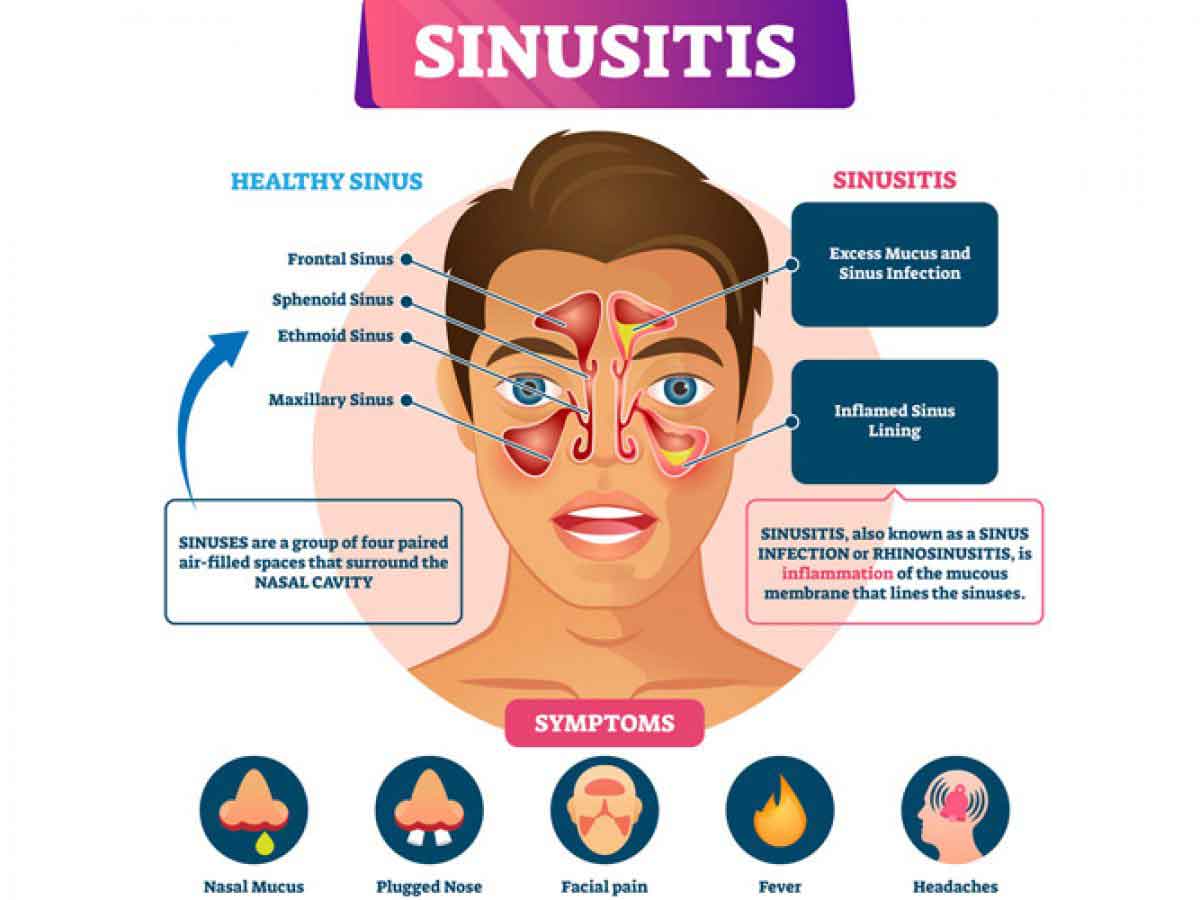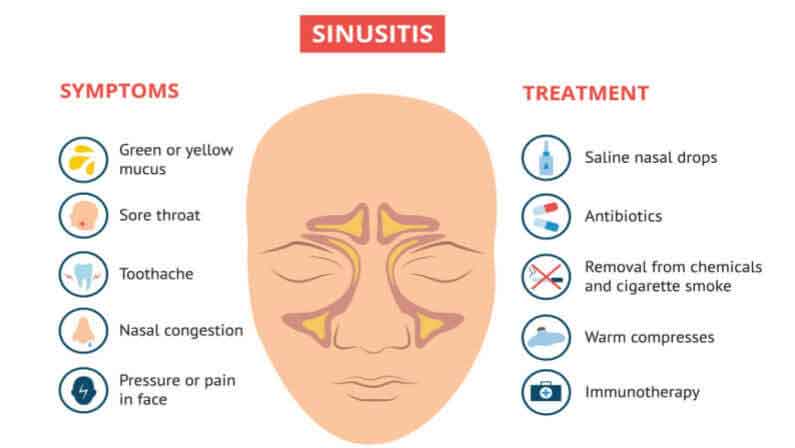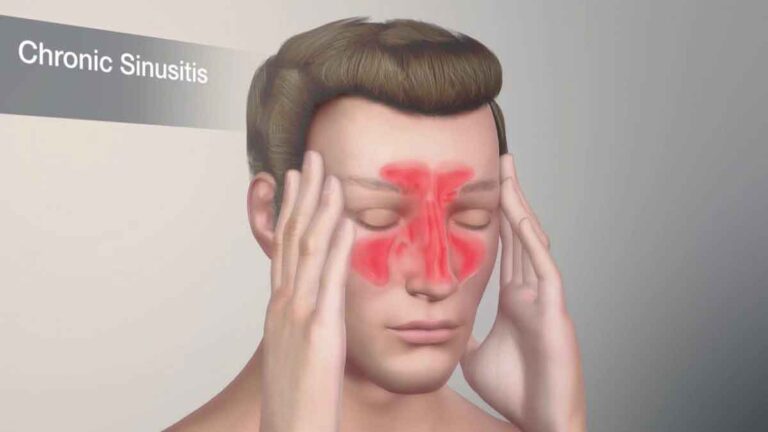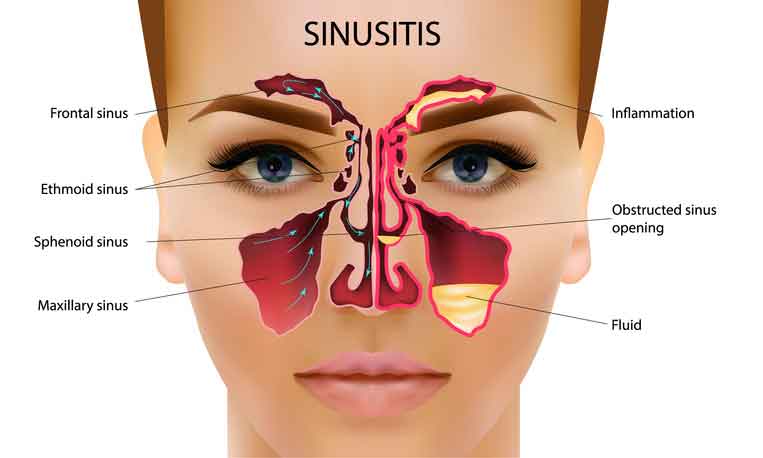WHAT IS CHRONIC SINUSITIS?
Chronic sinusitis happens when the spaces inside your nose and head (sinuses) are swollen and inflamed for three months or longer, despite treatment.
This common condition interferes with the way mucus generally drains, and makes your nose stuffy. Breathing through your nose might be difficult, and the area around your eyes might feel swollen or tender.
Chronic sinusitis could be brought on by an infection, growths in the sinuses (nasal polyps), or swelling of the lining of your sinuses. Also known as chronic rhinosinusitis, the condition can affect both adults and children.
SYMPTOMS
Common signs and symptoms of chronic sinusitis are :
- Nasal inflammation
- Thick, discolored discharge from the nose (running nose)
- Drainage on the back of the throat (postnasal drainage)
- Blocked or stuffy (congested) nose causing difficulty breathing via your nose
- Pain, tenderness, and swelling around the eyes, cheeks, nose, and forehead
- Decreased sense of smell and taste
Other signs and symptoms could include:
- Ear pain
- Headache
- Aching in your upper jaw and teeth
- Cough or throat clearing
- Sore throat
- Bad breath
- Fatigue
Chronic sinusitis and acute sinusitis have the same signs and symptoms. But acute sinusitis is a temporary infection of the sinuses often related to a cold. The signs and symptoms of a chronic sinusitis last at least twelve weeks, but you might have several episodes of acute sinusitis before developing chronic sinusitis. Fever is not a common sign of chronic sinusitis, but you might have one with acute sinusitis.
WHEN SHOULD YOU SEE A DOCTOR?
Schedule an appointment with your doctor if :
- You have had sinusitis a number of times, and the condition does not respond to treatment
- You have sinusitis symptoms that last more than ten days
- Your symptoms do not improve after you see your doctor
See a doctor immediately if you have the following signs or symptoms, which could indicate a severe infection :
- Fever
- Swelling or redness around your eyes
- Severe headache
- Forehead swelling
- Confusion
- Double vision or other vision changes
- Stiff neck
CAUSES :-
Common causes of chronic sinusitis include :
- Nasal polyps – These tissue growths could block the nasal passages or sinuses.
- Deviated nasal septum – A crooked septum — the wall between the nostrils — might restrict or block sinus passages, making the symptoms of sinusitis worse.
- Other medical conditions –The complications of conditions like cystic fibrosis, HIV, and other immune system-related diseases can lead to nasal blockage.
- Respiratory tract infections – Infections in your respiratory tract — most commonly colds — could inflame and thicken your sinus membranes and block mucus drainage. These infections could be caused by viruses and bacteria.
- Allergies such as hay fever – Inflammation that occurs with allergies could block your sinuses.
RISK FACTORS :-
You have an increased risk for chronic sinusitis if you have :
- A deviated nasal septum
- Nasal polyps
- Asthma
- Aspirin sensitivity
- A dental infection
- A fungal infection
- Tumors
- An immune system disorders like HIV/AIDS and cystic fibrosis
- Hay fever or another allergic condition
- Regular exposure to pollutants like cigarette smoke
COMPLICATIONS :-
Severe complications of chronic sinusitis complications are rare, but may include :
- Vision problems – If your sinus infection spreads to your eye socket, it could cause reduced vision or possibly blindness that can be permanent.
- Infections – Uncommonly, people with chronic sinusitis might develop inflammation of the membranes and fluid surrounding the brain and spinal cord (meningitis), an infection in the bones, or a severe skin infection.
PREVENTION
Take these steps to minimize your risk of getting chronic sinusitis :
- Avoid upper respiratory infections – Avoid contact with people who have colds or who are ill with other infections. Wash your hands frequently with soap and water, particularly before meals.
- Manage your allergies – Work with your doctor to keep the symptoms under control. Avoid exposure to things you are allergic to whenever possible.
- Avoid cigarette smoke and polluted air – Tobacco smoke and air contaminants could irritate and inflame your lungs and nasal passages.
- Use a humidifier – If the air in your home is dry, such as it is if you have forced hot air heat, adding moisture to the air might help prevent sinusitis. Make sure to keep the humidifier clean and free of mold with a regular, thorough cleaning.
DIAGNOSIS
Your doctor might ask about your symptoms. He or she might feel for tenderness in your nose and face and look inside your nose in a physical examination.
Methods for diagnosing chronic sinusitis are:
- Imaging tests – Images taken using CT or MRI could show details of your sinuses and nasal area. These may pinpoint a deep inflammation or physical blockages, such as polyps, tumors, or fungi, that are difficult to detect using an endoscope.
- Looking into your sinuses – A thin, flexible tube with a fiber-optic light inserted through your nose enables your doctor to see the inside of your sinuses. This could help your doctor see a deviated nasal septum, polyps, or tumors.
- An allergy test – If your doctor suspects that allergies might be triggering your chronic sinusitis, he or she may recommend an allergy skin test. A skin test is safe and quick and could help detect what allergen is responsible for your nasal flare-ups.
- Samples from your nasal and sinus discharge (cultures) – Cultures are usually unnecessary for diagnosing chronic sinusitis. However, when the condition fails to respond to treatment or is worsening, your doctor might swab inside your nose to collect samples that might help determine the cause, such as bacteria or fungi.
TREATMENT
Treatments for chronic sinusitis include :
- Nasal corticosteroids – These nasal sprays help to prevent and treat inflammation. Examples involve fluticasone, triamcinolone, budesonide, mometasone, and beclomethasone. If the sprays are not effective enough, your doctor may recommend rinsing with a solution of saline mixed with drops of budesonide or using a nasal mist of the solution.
- Saline nasal irrigation, with nasal sprays or solutions, minimizes drainage and rinses away irritants and allergies.
- Oral or injected corticosteroids – These medications are used to relieve inflammation from severe sinusitis, particularly if you also have nasal polyps. Oral corticosteroids could cause severe side effects when used long-term, so they are used only to treat severe symptoms.
- Allergy medications – If allergies are causing sinusitis, your doctor might recommend allergy medications.
Aspirin desensitization treatment,if you have reactions to aspirin that induce sinusitis and nasal polyps. Under medical supervision, you are slowly given larger doses of aspirin to increase your tolerance. - Antifungal treatment –If your infection is because of fungi, you may have antifungal treatment.
- Medication to treat nasal polyps and chronic sinusitis –If you have nasal polyps and chronic sinusitis, your doctor might give you an injection of dupilumab or omalizumab to treat your condition. These medications might reduce the size of the nasal polyps and lessen congestion.
Antibiotics
Antibiotics are at times necessary for sinusitis if your infection is caused by bacteria. If your doctor cannot rule out an underlying infection, he or she may recommend an antibiotic, sometimes with other medications.
Immunotherapy
If allergies are contributing to your sinusitis, allergy shots (immunotherapy) that help reduce the body’s reaction to specific allergens may improve the condition.
Surgery
In cases resistant to treatment or medication, endoscopic sinus surgery could be an option. For this procedure, the doctor uses a slim, flexible tube with an attached light (endoscope) to explore your sinus passages.
Depending on the source of the blockage, the doctor may use various instruments to remove tissue or shave away a polyp that is causing a nasal blockage. Enlarging a narrow sinus opening also might be an option to promote drainage.
If you or anyone you know is suffering from chronic sinusitis, our expert providers at Specialty Care Clinics will take care of your health and help you recover.
Call 469-545-9983 to book a telehealth appointment for an at-home check-up.




